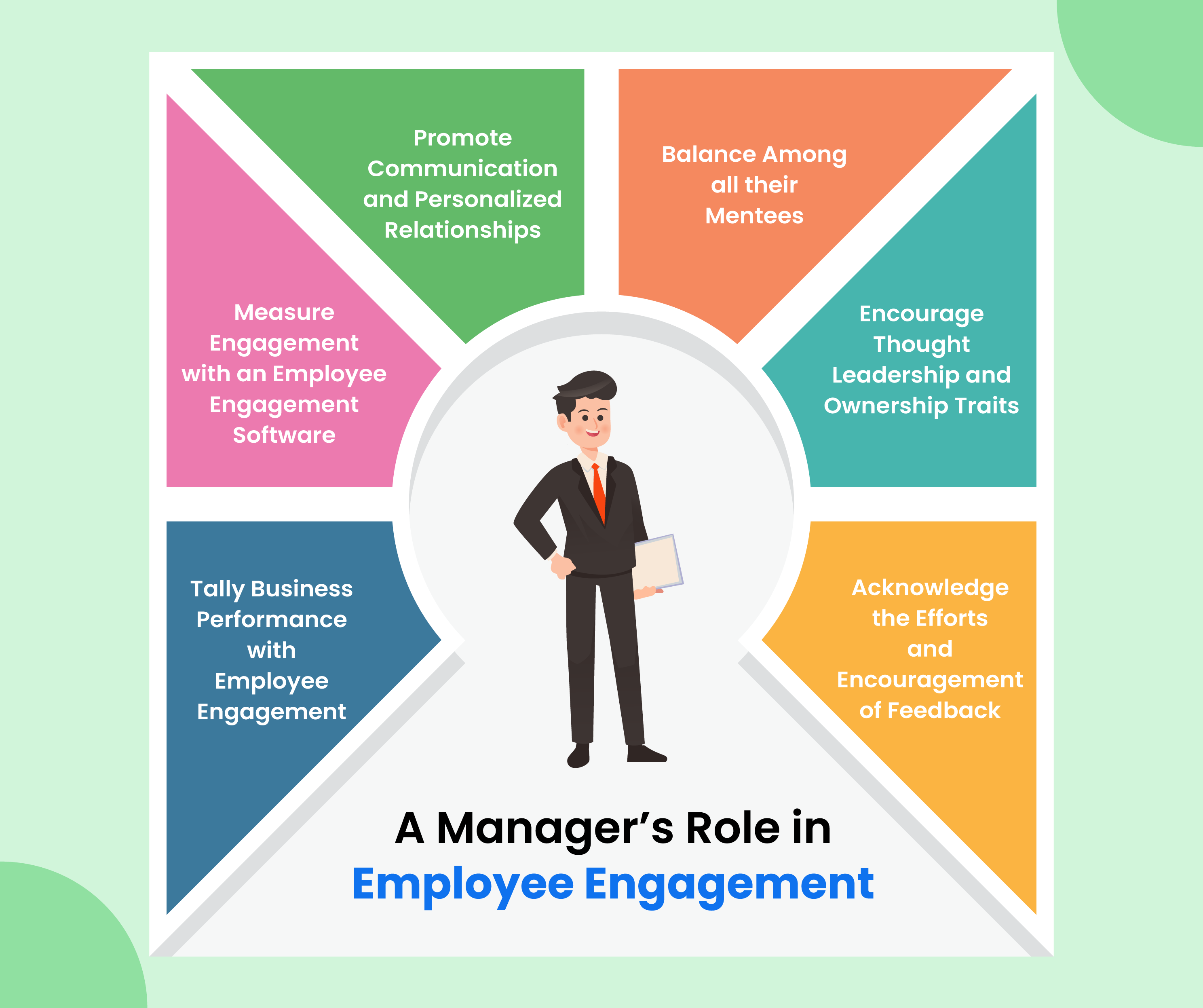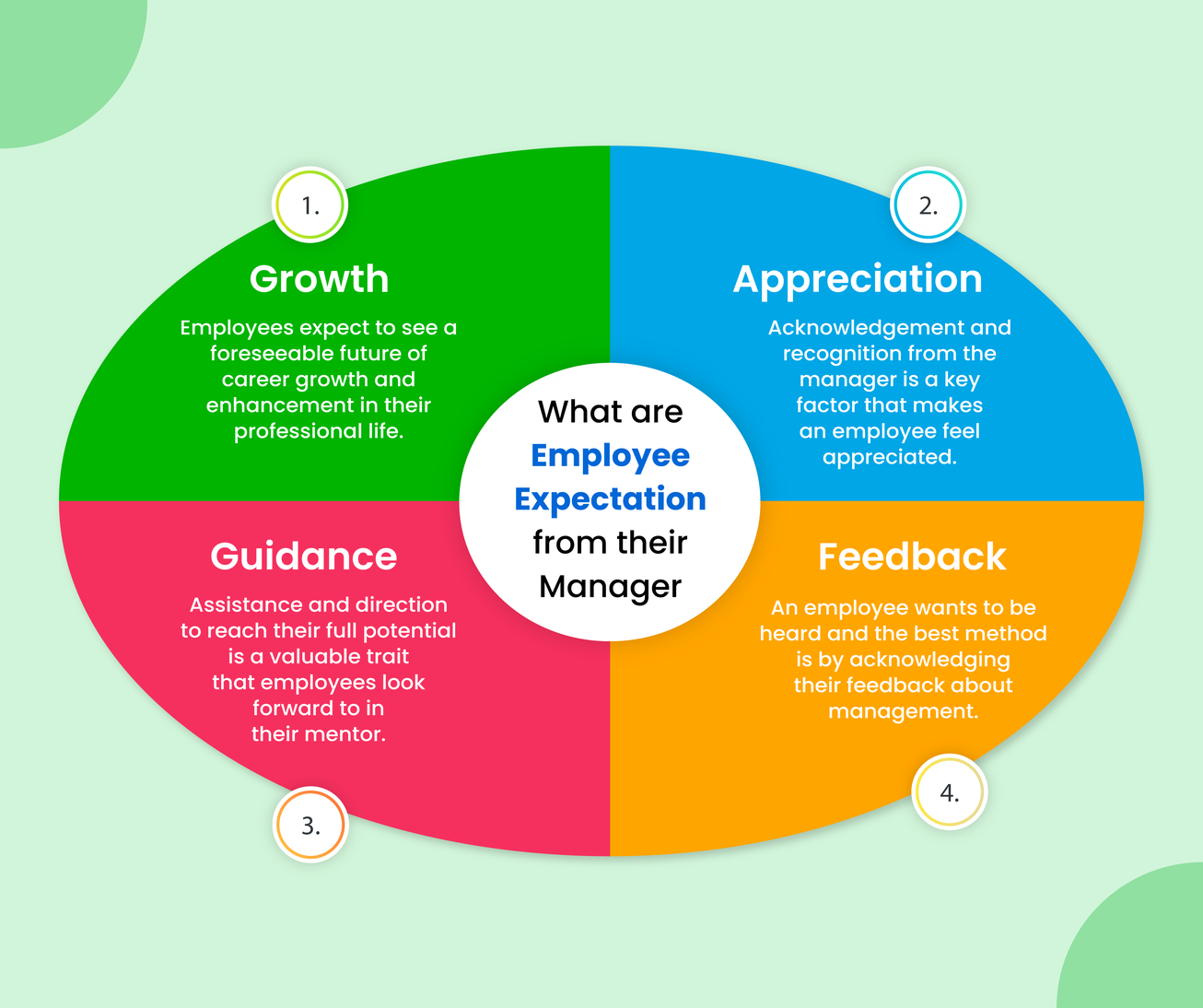Companies often look up to HR leaders to facilitate employee engagement. But, they aren’t the only ones responsible for coming up with innovative employee engagement ideas. A manager’s role in employee engagement is critical as it helps their teammates feel engaged and motivated at work so they can deliver better productivity.
But, why is manger’s role in employee engagement important?
Managers have a more significant influence on the day-to-day interactions, processes, and operations, which can help them understand the employees better and create strategies to keep them engaged.
Employees want their managers to be approachable, someone who has their back. And that’s exactly what a manager can do. By meeting the workers regularly, they can build trust, address their questions in a better manner, and help them achieve their personal and professional goals.
In this blog post, we’ll look at the manager’s role in employee engagement, along with the employees’ expectations from managers.
How to Engage Employees?

A manager’s role in employee engagement is pivotal. Managers are more involved in the everyday work life of their team and thus small efforts can go a long way in keeping employees engaged.
Here’s how to be a good manager to your employees and boost their engagement and performance in no time:
1. Promote Communication and Personalized Relationships
A manager’s role in employee engagement begins by promoting communication in the workplace and encouraging employees to foster personal relationships within and outside their team. Often, employees cannot communicate with their employers, peers, and teammates effectively. When they don’t get clear instructions, they feel lost and unmotivated to complete their work.
As a manager, it’s your responsibility to leverage proper interactive tools to ensure seamless communication between your team members. Further, also encourage your employees to connect with their peers, get to know them, and build meaningful relationships — both inside and outside of the office.
The more comfortable your teammates are around one another, the more openly they’ll voice opinions and brainstorm new ideas. This level of connection is crucial to boost an employee’s morale, productivity, and ultimately engagement in the company.
2. Create A Healthy Work Environment
The key to establishing a highly-engaged organization is to create a healthy work environment. This implies creating an environment where employees feel physically and mentally safe. It also includes promoting innovation and individuality and encouraging flexibility and teamwork to enable employees to reach their goals.
However, creating a healthy workspace requires managers to follow some strategies, such as:
- Providing opportunities to employees to express their concerns, opinions, and feedback about a particular matter. This makes them feel heard, ultimately boosting their confidence and engagement.
- Appreciating your employers even for doing their regular jobs.
- Creating a work environment where employees feel comfortable and don’t feel scared while expressing their feelings.
3. Create Balance Among All their Mentees (Say No to Favoritism)
There are mainly two types of favoritism in the workplace:
- Arbitrary favoritism: When managers treat some employees differently than others because they connect well with them.
- Performance-based favoritism: When managers appreciate the efforts of top-performers more than the others.
Both these types of favoritism can be dangerous for the organization. Hence, managers must avoid it while rewarding employees. Here’s how:
- Check your behavior patterns towards the employees and ensure that your actions are not perceived as partiality in the office.
- Instead of appreciating a few people in a year, sprinkle praise towards all employees, even for minor achievements.
- Sometimes a job role doesn’t require employees to go above and beyond to complete a particular task. For example, their role might simply be to document the customers’ information. Appreciate them for filling accurate details and avoid employee disengagement in the organization.
4. Encourage Thought Leadership and Ownership Traits
Employees are future leaders and managers. Therefore, managers need to instill a sense of thought leadership and ownership within employees, so they can see a future for themselves in the organization and invest themselves fully to achieve organizational goals.
Here’s how managers can encourage employees to take the lead:
- Lead by example. Your behavior and actions will set the standards for your employees and show them how it’s done.
- Communicate your vision and mission to employees right from day one and ask for their input to see if they are committed to working toward that result.
- Individually discuss and recognize your employees’ strengths and interests and allow them to participate in decision-making as much as you can.
- Allow your employees to make important company decisions.
- Encourage them to solve their problems and show confidence in their judgment.
5. Acknowledge the Efforts and Encourage Feedback
No matter how hard an employee works for the organization, if they feel they aren’t appreciated for their effort, they’re likely to feel disengaged and demotivated at work. Hence, a manager must acknowledge their achievements to foster positivity and healthy behavior in the workplace.
Further, understand what your employees truly need to do their best work. Without it, you’ll be stuck enforcing irrelevant engagement policies in the company.
Gather employee feedback through surveys or one-to-one meetings, evaluate performance, and get insights into what different motivators they need and how to engage employees effectively. The more specific the feedback, the more powerful actions you can take.
6. Tally Business Performance with Engaged Employees
How do you gain actionable insights to improve employee engagement and build a thriving business? Simple. Through employee engagement surveys.
Surveys play a crucial role in gathering employee opinions and feedback about the organization’s workflows, analyzing the data, and sharing insights into improvement areas. You can share a well-designed questionnaire that includes the right performance-based questions, making it easier to identify specific outcomes. Further, surveys ask straightforward, pointed questions that evaluate the employees’ opinions about the managers’ effectiveness, behavior, and leadership skills.
Managers can then act on survey results and strategies. After which, they can implement the best employee engagement strategies and policies to help employees grow and improve their performance.
Leena AI empowers all stakeholders by running customizable employee engagement surveys for analyzing employee sentiments, driving real-time actionable insights, and identifying the exact areas that need more attention to increase employee performance. It informs managers about the dissatisfied and unhappy employees in real-time and their challenges, so they can make efforts to increase their engagement. The best part? You can integrate these surveys on slack or any other communication channel. This way, you can understand the roots of employee disengagement in the organization and retain valuable employees and avoid attrition.
7. Choose an Intelligent Employee Engagement Software
Leveraging an employee engagement software can help HR managers request and track feedback from their employees, recognize their achievements, and promote positive behavior. It can help understand employee sentiments, enhance communication, and draw actionable insights from their feedback.
Leena AI is an all-in-one HR software that makes it easy to gather feedback from employees across the organization, share key insights with managers, and turn them into actionable insights that transform employee engagement. Leena AI’s employee engagement tool helps managers assess employee sentiments and spot the ones who are disengaged, unhappy, and are more likely to leave the company. It redefines the entire aspect of employee engagement and makes taking actions seamless for HRs and managers, alike.
Managers can easily notice the name of all such employees on the dashboard alongside their real-time challenges and take appropriate actions to eliminate them. Not only can this help retain top talent in the organization, but it also saves your hiring, employee onboarding and training costs.
What are Employee Expectations from their Manager?
Managers must know what their employees expect from them and their organization so they can develop inclusive employee engagement strategies accordingly. Below are a few employee expectations:
1. Growth
Imagine a workplace where employees are doing the same work without upskilling themselves. How will it affect them? First, their job will start getting monotonous. Second, there won’t be any chances of career development, resulting in disengaged employees.
Employees want opportunities to grow and upskill in their workplace. In fact, a survey by business.com states that employees with opportunities for personal development are 15% more engaged as compared to employees who don’t. It is clear that employees prefer organizations who invest in their employees by providing learning and development opportunities. Hence, prioritizing employee growth can significantly impact employees’ engagement and performance levels. Employees who make the most of these development programs to learn new skills are motivated, empowered, satisfied and stay actively engaged at their jobs.
To achieve this, managers must work with employees to understand the areas they need improvement in, plan out individual goals for their careers, and recommend courses and projects based on their individual factors. Do not forget to measure their growth with the progressive HR tech to enhance employee experience.
2. Appreciation
Employees are hungry for recognition. They want to be appreciated for their achievements, and not doing so can lead to disengagement and dissatisfaction among employees. This makes them feel valued and motivated to deliver the best results. Moreover, it shows them you care and consider them an important part of your company.
However, employee recognition doesn’t have to be something huge or fancy. As managers, you can leverage the following strategies:
- Put the employee’s name on notice boards along with their achievements.
- Ask them how they want to be rewarded.
- Praise them during daily virtual meetings.
- Have an “employee of the week” or “employee of the month” program.
3. Guidance
As managers, there will be times when you have to let your employees take the lead and complete the project independently. For employees to feel motivated to work hard to attain the best results, managers must guide them throughout the tasks.
Employees must feel that their company has confidence in their decisions, and an excellent way to show this is by not interfering in whatever they do. Even if they don’t get the desired results, recognize their effort, showing them their hard work didn’t go unnoticed. Also, provide them with honest feedback to help them improve.
4. Feedback
Nowadays, employees crave regular feedback from their managers. However, many organizations consider that annual reviews are sufficient to provide feedback to employees. But, they’re missing a huge opportunity to foster meaningful connections with their staff, resulting in disengagement and poor performance.
Managers must conduct regular one-to-one meetings with each teammate to build personal connections with them and understand what motivates them. Spending more time with your team members regularly can instill trust among them, help managers address their concerns effectively, and help employees meet their goals.

Key Takeaways
- Promote seamless communication in the workplace and encourage employees to connect with their co-workers on both professional and personal levels.
- Create a healthy work environment where employees can express their feelings without fearing judgment or embarrassment.
- Treat all employees equally and avoid favoritism in the workplace to boost employee engagement, productivity, and motivation to work harder.
- Encourage employees to learn thought leadership and ownership skills to take the lead in the future.
- One of the employee engagement goals for managers is to measure their performance. Use surveys to gather employee feedback, drive actionable insights into their performance, and use results to transform their experiences.
- Managers can use employee engagement software to spot disengaged employees and take actionable steps to address their challenges before they become huge.
- Employees are attracted to companies that provide learning and development opportunities to help workers acquire new skills relevant to their jobs.
- Every employee wants their managers to recognize their accomplishments and appreciate them in front of their team members.
- Managers must guide their employees throughout the project. And even if they don’t succeed, managers must notice their hard work, praise them, and provide them with honest reviews to help them grow.
- In addition to annual reviews, managers should conduct one-to-one meetings to know what motivates them to work hard.
Empower Your Managers with Leena AI
With the changing world of work, the needs and requirements of employees are also changing over time — which can hamper the workforce’s engagement. So, to ensure that no employees are left unmotivated, the role of an employee engagement manager is of utmost importance. Not only do they create the right strategies and leverage proper tools to engage employees, but they also build social connections with them, learn from their feedback, and optimize the entire process, if necessary.
However, manually managing all these tasks can be pretty complex. Technology combined with human intelligence will accelerate the management quality in an organization. This is where a game-changing employee engagement software like Leena AI can help transform employee experiences.
With Leena AI, you can:
- Convert employee feedback from surveys into results
- Get real-time insights to an employee’s work life
- Measure performance of the entire organization, each department and your specific team
- Map out disengagement in your team via sentiment analysis at the early stages and take quicker actions
Bring the best in your organization with the right employee engagement software
Book A Demo TodayFrequently Asked Questions on a Manager’s Role in Employee Engagement
Q1) How do you empower managers?
The role of managers in employee development is extremely important. Managers have a lot of responsibility on their shoulders, and it’s crucial for them to feel motivated and supported by their employers. Here’s how you can empower them:
- Make them feel confident about their decisions and also show them the whole organization has confidence in them.
- Make sure they have the right combination of skills and resources to excel in their job.
- Allow them the complete autonomy to make their own decisions.
Q2) Why is it important for managers to empower their employees?
When managers empower their employees, employees feel recognized, motivated, and satisfied at their jobs, resulting in a longer association and lower churn. Empowered employees use their creativity to achieve the organization’s goals, and go out of their way to learn more and apply their learnings to organizational challenges. Not only do empowered employees persevere through their work, they also aspire to grow in their roles, knowing that their managers trust them and have their back.
Q3) Why are managers key to employee engagement?
The role of a manager in an organization for employee engagement is quite significant. Managers spend most of their time with employees and build personalized relationships and connections with them. Further, they leverage each employee’s strengths to empower and motivate them, whatever position they’re in. In short, they know what employees want and can easily address their queries.
Q4) What great managers do to engage employees?
Great managers do a lot to engage their employees. These managers prioritize the strength of their employees and provide opportunities to excel at them. They make sure that employees reach their full potential with the right guidance. With the right guidance employees can take ownership for their projects and be accountable for it. Accountability helps in being responsible and managers make sure to acknowledge the efforts and provide valuable feedback for the misses.







1 Comment